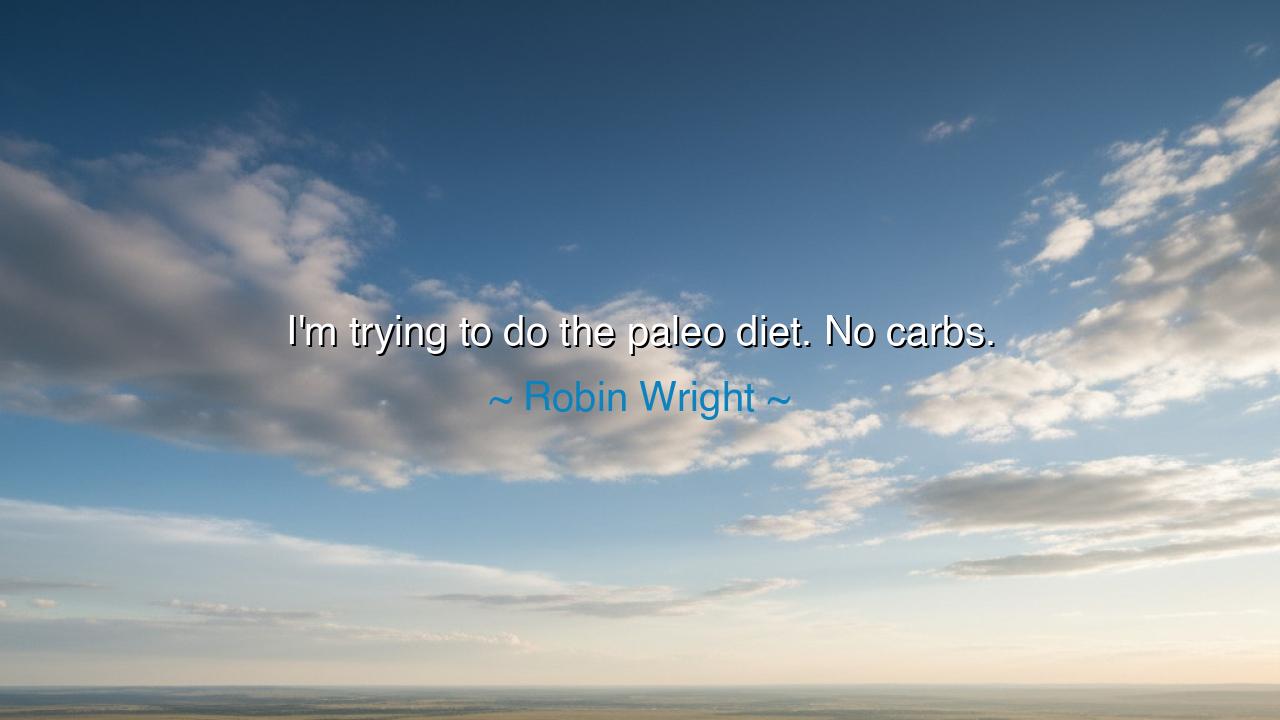
I'm trying to do the paleo diet. No carbs.






The words “I’m trying to do the paleo diet. No carbs” by Robin Wright are brief, almost casual — yet within them lies a timeless struggle between discipline and desire, between the body’s natural instincts and the mind’s pursuit of control. Beneath their simplicity dwells a universal story: the human longing to return to a more authentic state of being, to rediscover strength through simplicity. Wright’s statement, though rooted in the modern age of diets and health fads, speaks to something far more ancient — a yearning to realign with the primal rhythms of life, untainted by excess or indulgence.
The paleo diet, inspired by the eating habits of our prehistoric ancestors, is itself an echo of the human origin story — a call to return to what is elemental. It reminds us of an age before abundance dulled the senses, when survival demanded mindfulness and every meal was earned through effort. To say “no carbs” is not merely to abstain from bread or sugar, but to renounce the artificial ease of modern living — to seek renewal through restraint. The ancients knew that strength was not found in indulgence, but in temperance. The Spartans, for instance, ate simply — coarse bread, black broth, little else — and yet they forged bodies and wills that became legend.
Wright’s declaration captures the spirit of self-discipline, a virtue revered across all civilizations. In ancient India, the sages of the Vedas practiced tapasya — austerity — to burn away weakness and reveal inner fire. In Greece, Pythagoras taught that moderation in food was essential to clarity of thought. And in Rome, the philosopher Seneca wrote that “to live well is to live simply.” In every age, humanity’s wisest souls understood what Wright’s modern effort reflects: that the body is a mirror of the mind, and the taming of one leads to mastery of the other.
But beneath the discipline lies another, subtler truth. The pursuit of purity in diet — or in anything — can never be only about appearance or health; it must be an act of reverence for life itself. To choose one’s food carefully is to honor the sacred exchange between the human being and the earth that sustains them. Our ancestors, who hunted with respect and gathered with patience, knew this sacred rhythm well. In seeking a “paleo” way of eating, one symbolically seeks to rekindle this ancient bond — to eat not from greed, but from gratitude.
Yet even as we admire this discipline, we must remember that balance is the highest wisdom. The ancient Taoists warned against the extremes of deprivation and indulgence alike. To deny the body’s needs entirely is as harmful as to indulge them without thought. The true path, they said, is found in harmony — where nourishment serves both body and spirit. Wright’s pursuit of health through the paleo diet reflects this journey: the search for equilibrium in a world of abundance, a return to strength through simplicity, and perhaps, a yearning to hear once more the whisper of nature within the noise of modern life.
Consider the story of Milo of Croton, the legendary Greek athlete who trained by carrying a calf each day until it became a bull. His strength did not come from sudden feats, but from daily dedication, from constancy in small acts. In the same way, those who transform their health do so not through extremes, but through persistence — through every mindful choice, every moment of restraint, every act of honoring the self.
So, dear listener, take this lesson from Robin Wright’s simple words: transformation begins in intention. To live purely, one must eat, move, and breathe with awareness. The food you take in becomes the energy of your thoughts, the vitality of your heart, the vessel of your purpose. Whether you follow a paleo path or another, let your diet not be a cage of rules but a covenant with life — a promise to nourish yourself with respect, discipline, and love. For when you live in alignment with what is natural and true, you do not merely change your body — you reclaim your ancient strength, the inheritance of those who once lived close to the earth and called it sacred.






AAdministratorAdministrator
Welcome, honored guests. Please leave a comment, we will respond soon